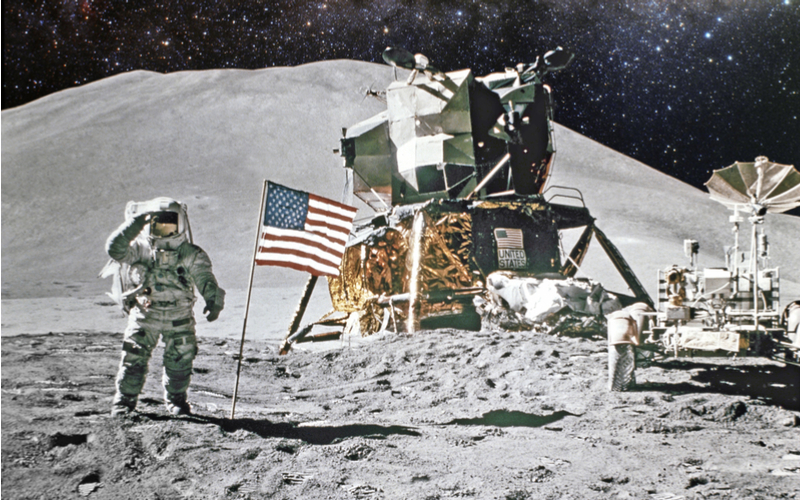If We Put a Man on the Moon, We Can Surely…
The just-released movie “Apollo 11” is spectacular.
Using nothing but beautifully restored original footage and sound, almost all from July 1969 (the month of the historic lunar mission), this documentary conveys the brilliance, determination, and courage of the legions of men and women who made possible Neil Armstrong’s and Buzz Aldrin’s walks on the moon and their safe return, with crewmate Michael Collins, to the earth.
If you watch “Apollo 11,” I recommend, if possible, that you do as my son, Thomas, and I did: watch it in an IMAX theater. Feeling – not only hearing – the stupendous roar of the five F-1 engines that lifted the Saturn V from launch pad 39A is alone worth the price of admission.
This film cannot help but make all who see it proud to be human. From the virtuosity of the scientists and engineers whose complex calculations were as precise as their creativity was vast, to the courage and dedication of three men willing to ride a rocket to and from an inhospitable orb nearly a quarter of a million miles from earth, the magnificence of NASA’s achievement cannot be doubted and should forever be celebrated.
Yet as I walked out of the theater, my exhilaration was tinged with anxiety. I worry that recollecting so vividly the unambiguous success of the U.S. government’s mission to the moon will convey a wholly unrealistic impression of the power of the state.
“If we can put a man on the moon, surely we can….”
Escaping the grip of earth’s gravity is possible if we devote to the effort enough brain-power and material resources. Not so escaping the grip of scarcity. This latter exploit is impossible. Failure to recognize the inescapable reality of scarcity is the most obvious error committed by those who conclude from NASA’s successful moonshot that almost anything is possible.
To get to the moon, NASA spent more than $25 billion, or nearly $200 billion in 2019 dollars. That’s $200 billion worth of real resources – human labor, factory capacity, land, fuels, chemicals, and other inputs – all of which had alternative uses. Had these resources not been used by NASA, they would have been used to produce other goods and services – outputs that will never exist and whose foregone stream of benefits for humanity cannot be known or enjoyed.
To highlight this reality is not to insinuate, and much less to insist, that those resources were wasted. “Cost” is no synonym for “waste”; all uses of resources have costs. But costs nevertheless are real even when they are unseen or forgotten. Watching a superbly done celebration of NASA’s stunning success makes it too easy, a half-century later, to forget the costs of NASA’s efforts. And because NASA spent other people’s money, there’s a genuine possibility that the costs of the moonshot exceeded its benefits.
But let’s here grant that each and every resource spent by the U.S. government to reach the moon was spent wisely. The fact remains that even a cost-justified space program is an obstacle to the achievement of other worthwhile goals rather than evidence that those goals are obtainable. As Thomas Sowell observed, it is precisely because we put a man on the moon that we did not achieve as many other valuable outcomes as we would have achieved in the absence of a space program.
Achieving Social Harmony is Not an Engineering Problem
A deeper error is to believe that the challenges confronting society are akin to those confronting politicians and scientists who wish to reach the moon. A single well-defined goal such as that pursued by NASA differs fundamentally from the kinds of goals typically articulated by people who call on government to ‘solve’ this that social problem – problems such as improving everyone’s health, raising living standards for the poor, and further cleaning the environment.
NASA’s moonshot mission was well-defined in its specifics: before the end of the 1960s land men, two at a time, on the moon, and bring them home safely. Once the details of this very specific goal were settled upon, achieving it became an engineering challenge: use the allotted amount of resources to achieve the agreed-upon goal.
But the challenge of living together peacefully and productively in society is not an engineering challenge. Each individual in a free society has goals that are often incongruent with – and sometimes in direct conflict with – the goals of others. Mr. Smith wants less traffic congestion while Ms. Jones wants more green space. Even if each person agrees that the other’s goal has merit, deciding how many more miles of roads to build (and, hence, how much green space to cover with pavement) is not an engineering problem. The challenge instead is to reach mutually acceptable agreement.
Unlike the engineering challenge of, say, figuring out the best angle and speed at which a lunar-bound spaceship should rocket out of earth orbit, there is no objectively correct answer to the question of how many more miles of roads to build. The ‘correct’ answer is simply that which emerges from a process of exchange among all persons who ‘should’ have a say in the matter.
Perhaps Smith will offer to pay Jones enough to entice her voluntarily to agree to live with a bit less – or perhaps a lot less – green space. Alternatively, Jones might persuade Smith voluntarily to settle for a bit less – or perhaps a lot less – road construction. A large number of different outcomes is possible, each one potentially being the best given the preferences and bargaining of the Smiths and Joneses.
In a nation of hundreds of millions of diverse individuals, there can never be scientifically objective answers to questions such as “At what rate should carbon emissions be cut?” or “What is the maximum accepted health risk for new pharmaceutical products?” or “How many U.S. soldiers should remain in Syria?”
Although politicians, bureaucrats, and pundits typically answer such questions as if their answers are scientifically objective, they are nothing of the sort. Such answers would be scientifically objective only if there were near-unanimous agreement not only on the goals that government should pursue but also on the precise manner in which the pursuit of each of these uncountably large number goals is to be traded off against the pursuit of other goals.
As long as Americans disagree on, say, just how much economic freedom should be sacrificed today in order to reduce the risks of warmer global temperatures tomorrow, the challenge confronted by the U.S. government is fundamentally different from the problem of successfully landing men on the moon. The latter problem is one of engineering, and the methods used to solve that problem are simply unavailable for determining what is the ‘correct’ amount of economic freedom to suppress in order to reduce the risks of global warming. Ditto for the problem of determining how many resources the government should commandeer for state-supplied health care. Indeed, ditto for nearly every problem that people clamor for the government to ‘solve.’
We can admire the engineering prowess that enabled NASA to land men on the moon and return them safely to earth. But even if politicians (contrary to fact) were apolitical stewards of the public welfare, governing society is not an engineering task. It follows that NASA’s remarkable achievement emphatically does not imply that we should look to government to solve our problems.











